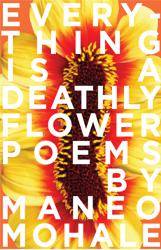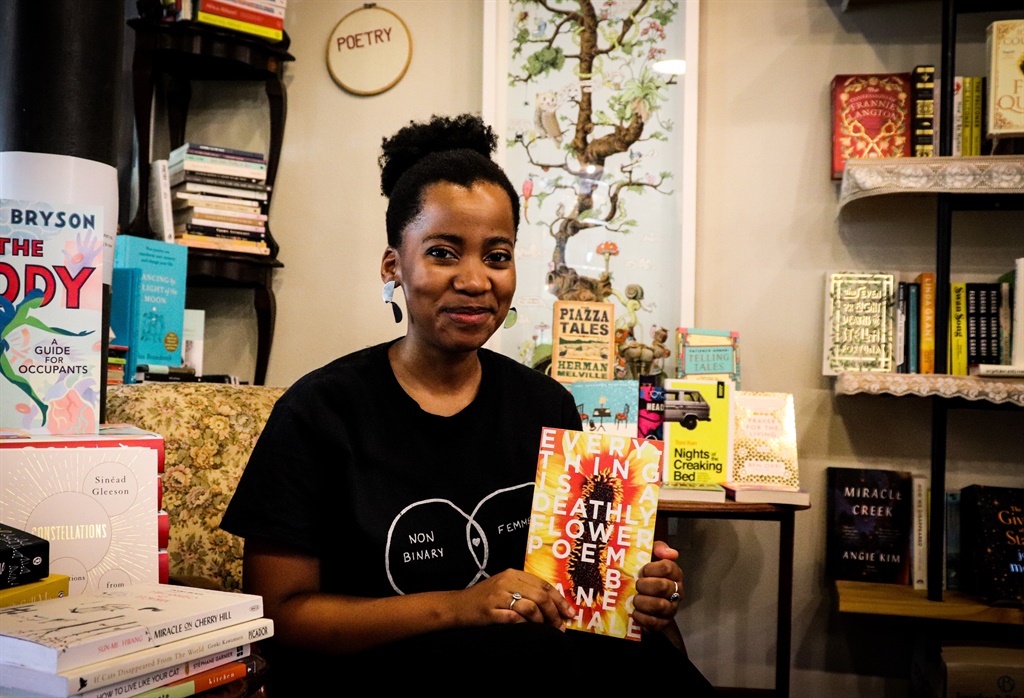
Poetry in South Africa is alive and well. Within the genre a literary revolution has begun to take shape, and it is holding a giant middle finger up to the hegemony that has formerly shaped the global literary scene.
At a time when the new international fad is to put poems on Instagram and Twitter, with much intent and hard work, writers like Koleka Putuma and Warsan Shire remind us that black womxn and their ability to tell their stories are limitless. Joining this literary squad is 27-year-old Maneo Mohale.
Everything is a Deathly Flower, the title of Mohale’s collection of 31 poems, is a deep reflection on the ambiguities of life.
Black, femme, queer and African are some of the multifarious identities held by the Benoni-born writer and editor, all of which pierce the veil of social constructions. Like a Venus flytrap having its daily sustenance, her words, provocative and intentional, become a weapon of mass destruction against violent systems.
I sat down with Mohale, whose debut poetry book appeared on shelf in September.
In Everything is a Deathly Flower, the reader is invited to embark on a rhythmic literary journey that tells tales of surviving sexual assault and navigating queerness as an African black femme person, who is also someone’s child and grandchild.
“I think I exist in this subliminal space of being interested in healing and of being someone who comes from a very particular political and activist background,” Mohale said.
To carry the weight of being unapologetic about one’s identity was difficult, she added.
Everything is a Deathly Flower by Maneo Mohale
uHlanga Press
66 pages
R180
“I’m seeing how the borders around words like ‘unapologetic’ are starting to dissolve for me. I think it sounds very sexy to say I am unapologetic, black, queer and femme, but there is lots of apology inside all of that. I wish we could talk about that part more, that there is a kind of grief and sorry sometimes in understanding what it means for you to be in the world, and what it means for a world that in many ways actively both tells you that you do not belong and asks you to make yourself smaller.
“The biggest thing for me was not to sit on this work and let it rot and fester inside of me, which it threatened to do many times. It was a difficult process.”
In the book’s acknowledgment section, Mohale writes: “This book is made by many hands. A consolidation of emotions with language and style which they play with throughout the book.”
SANDTON SKYE for Karabo Mokoena
Privileged to be able to do this, a bought safety.
We’re running out of bubbles and sushi, still
tender from an afternoon of taste and wet
and moan and reach. I’m used to love
on the edge of a cliff, unsurprised to find
myself in the tempest heart of another
triangle. Both brown and gasping and drunk –
the food’s arrived. I find a fig-leaf
and head downstairs. Unknown to me
uBaba has been watching us both. Glint
of a silver star on green felt, I feel my steps
quicken despite myself. Sisi –
is that a girl with you? The one upstairs?
What is it? Do you sleep together?
Are you alone here? Do you need anything?
I get off at six, if you girls need me
to come up. I can teach you. Unbuckling
his belt, so that I’m sure of his meaning.
Back inside the room, I smell smoke.
She also quotes the late Audre Lorde, one of the most powerful black feminist voices in poetry, thus: “Poetry is not only dream and vision; it is the skeleton architecture of our lives. It lays the foundations for a future of change, a bridge across our fears of what has never been before.”
These words reverberate throughout Mohale’s work as she shares memories of pain and existence in the most liberating way.
In describing how she navigated her mental and emotional wellness, Mohale said it was a journey of sharing complex vulnerabilities with the outside world.
“I did personal work that has given me the foundation to be able to do this. Therapy has helped. Having that real professional help was needed. I also have the best chosen families in the world who keep me grounded.”
Mohale said being a writer, especially of poetry, where so much of it benefits from isolation, had made it weird for her to come out into public life while promoting the book.
“I have been received with so much gentleness and generosity, and people have read me so generously. I feel like a container of stories now.”
She decribed what a hypothetical soundtrack to the book would contain.
“Radiohead’s In Rainbows would be the first track. It is a song that lives in the Everything is a Deathly Flower world, especially around ambiguity and tenderness. Next is Hugh Masekela’s Nomali because of how many mothers are hiding in this book.
“And I would say the gayest track would be Perfume Genius’ Queen: it is sparkly and reminds me of the little moments of glitter.
“The fourth track would be Bjork’s Anchor Song as it brings up the idea of belonging and wanting to stay rooted and grounded, but it also puts music to the words of feeling incarcerated by your body, by embodiment.”
A big milestone for her has been getting to tour Vancouver in 2020 through a programme she has been accepted into. “I realised, when that happened, that I wrote this book as a bridge to go back because there is also a lot of reckoning for me.
“There is healing that needs to happen because so much of this book is in South Africa, but it is also in Vancouver, where a very large part of my political education happened in five years.
“I grew up a lot in a very short time, so I am very excited to use this little baby to get myself back home.”
*This series on LGBTIQ life in Africa is made possible through a partnership with The Other Foundation. To learn more about its work, visit theotherfoundation.org
 | ||||||||||||||||||||||||||
Get in touchCity Press | ||||||||||||||||||||||||||
| ||||||||||||||||||||||||||
| Rise above the clutter | Choose your news | City Press in your inbox | ||||||||||||||||||||||||||
| City Press is an agenda-setting South African news brand that publishes across platforms. Its flagship print edition is distributed on a Sunday. |




 Publications
Publications
 Partners
Partners









